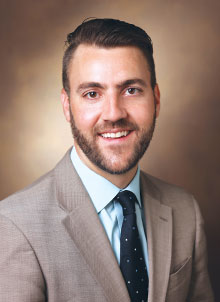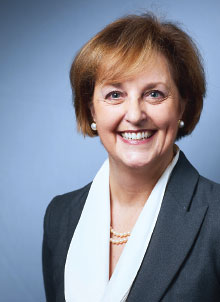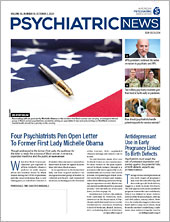Pregnant women with opioid use disorder (OUD) face numerous barriers to treatment, including high out-of-pocket costs and a dearth of health professionals who provide the necessary services, a study in JAMA Network Open has found. Furthermore, compared with nonpregnant women, pregnant women may have a tougher time merely obtaining an appointment with a health professional who can prescribe buprenorphine.
“We know that if pregnant women get treatment, they are less likely to die of an overdose, more likely to deliver at term, and more likely to keep custody of their child. We need to make this easier,” lead author Stephen W. Patrick, M.D., M.P.H., M.S., told Psychiatric News. Patrick is the director of the Center for Child Health Policy and an associate professor of pediatrics and health policy in the Division of Neonatology at the Vanderbilt University School of Medicine in Nashville.
In the study, “secret shoppers” posed as pregnant or nonpregnant women seeking treatment for OUD with either private or public health insurance. Between March 7 and September 5, 2019, they made a total of 28,651 calls to 6,324 health professionals in Florida, Kentucky, Massachusetts, Michigan, Missouri, North Carolina, Tennessee, Virginia, Washington, and West Virginia. The health professionals they called were randomly selected from publicly available treatment lists such as the Substance Abuse and Mental Health Services Administration’s list of buprenorphine-waivered health professionals and the Opioid Treatment Program Directory, which lists certified clinics that focus largely on methadone, although they may also offer other forms of medication treatment.
Among pregnant callers, 61.4% received an appointment with a buprenorphine-waivered health professional, compared with 73.9% of nonpregnant callers. Roughly 89% of both pregnant and nonpregnant callers were able to obtain appointments with opioid treatment programs.
The percentage of pregnant callers who obtained an appointment for buprenorphine treatment varied widely between states, ranging from 48.1% in Kentucky to 70.4% in North Carolina. For nonpregnant callers, appointment access ranged from 61.2% in Michigan to 83% in Florida. Some states showed great differences in access between pregnant and nonpregnant callers. For example, in Kentucky, only 48.1% of pregnant callers could obtain an appointment for buprenorphine treatment compared with 71.3% of nonpregnant callers. In contrast, access to appointments with opioid treatment programs did not vary between pregnant and nonpregnant callers, either from state to state or within a state.
Just over 26% of buprenorphine-waivered health professionals and 32.5% of opioid treatment programs granted appointments only when the caller agreed to pay cash for treatment. The median out-of-pocket cost for a first appointment for buprenorphine treatment was $250 compared with $34 for methadone treatment.
Patrick said he was taken aback by the study’s results. “Not being pregnant, being able to pay cash, and living in a state like Massachusetts means you are much more likely to get an appointment for treatment than if you are pregnant, using insurance, and living in Florida. There shouldn’t be this level of variability in the middle of an opioid crisis.”
Kimberly Yonkers, M.D., chief of the Division of Psychological Medicine and director of the Center for Wellbeing of Women and Mothers at Yale School of Medicine, expressed dismay at the findings with respect to buprenorphine.
“I’m distressed that the marketplace is the number-one driver of people being able to obtain buprenorphine treatment,” said Yonkers, who was not involved in the research. “It’s disheartening. The government and academia have put a lot of effort into making sure we have a lot of people waivered and trained.”
The results could suggest that training may not be enough for waivered health professionals to actually provide buprenorphine treatment, she added.
“Sometimes there needs to be more education on the nuts and bolts [of providing buprenorphine]—how you do an induction, how you write the prescription, whether you do the induction on-site or [the patient does induction at home], what can go wrong, and what you do if there’s a problem,” Yonkers said.
“The bottom line is that we need comprehensive federal action to fix this problem,” said Patrick. “It’s going to take more funding and more coordination, and it needs to be long-standing. Small programs or time-limited grants that we’ve seen from Congress have not appeared to make a dent in the problem. We should be acting with more urgency than we are now.”
The study was supported by the National Institute on Drug Abuse. ■
“Association of Pregnancy and Insurance Status With Treatment Access for Opioid Use Disorder” is posted
here.



